#fairy tales
Text
"Fairy tales are more than true," the princess read. "Not because they tell us that dragons exist, but because they tell us that dragons can be beaten."
The dragon considered this. "What of kings?"
"What of them?"
"Do fairy tales say how kings can be beaten?"
"Yes. By dragons..."
(With apologies and thanks to Neil Gaiman and G.K. Chesterton.)
1K notes
·
View notes
Text
Jack and the Beanstalk One-shot
Author note: You gotta do the Beanstalk story at least once, lol. My own spin and twist on a classic giant/tiny story.
The sun dipped below the horizon as Jack Whittaker, a ten-year-old homeless boy with dirty blond hair and blue eyes, sat huddled against the cold stone wall of an alley. His tattered clothes barely protected him from the biting wind. Jack's stomach growled loudly, but he ignored it.
"Have you ever heard about the land of giants up in the clouds?" asked one of the boys, his eyes wide with excitement. "They say there's a whole world up there, just waiting to be discovered."
"Giants? In the clouds?" Jack echoed, his eyes sparkling with wonder. "What do they look like?"
"Massive! Bigger than any building you've ever seen!" replied another boy, stretching his arms wide to emphasize his point. "And they live in houses so tall, they reach the sky!"
"Imagine what treasures we could find if we could get up there," mused a third boy, his voice filled with longing.
"Treasures?" Jack's heart skipped a beat. The thought of finding something valuable enough to change his life, to lift him out of poverty, was too enticing to ignore.
"Of course! They're giants, after all. Everything they own must be worth a fortune!" said the first boy with a mischievous grin.
"Jack, you should come with us next time we go up there," one of the boys suggested, noticing the younger boy's interest.
"Really?" Jack asked hesitantly, torn between excitement and fear. The idea of climbing into the clouds to explore the land of giants was both thrilling and terrifying.
"Sure, why not?" replied the older boy, his grin growing wider. "I heard one of the older bandit guilds got their hands on some magic beans. They grew the giant stalk just north of the kingdom. It's still there; neither the giants nor kings men have cut it down yet. This is our chance!"
"Maybe...maybe I will," Jack whispered.
One day, Jack found himself surrounded by a group of older boys who were eager to embark on their next adventure
"Jack," said one of the boys, his eyes twinkling with mischief, "we're going up tonight. You've heard our stories, and I know you're curious. Don't you want to see it all for yourself?"
Jack hesitated, torn between the allure of the unknown and the fear that gripped him at the thought of facing the giants. He stared at the ground, scuffing his worn shoes against the cobblestones as he weighed his options.
"Come on, Jack," urged the first boy, slapping him on the back. "You've got nothing to be afraid of. We'll keep you safe."
"Alright," he breathed, his voice trembling with anticipation. "I'll do it. I'll climb the beanstalk with you."
"Welcome aboard!" the boys cheered, clapping him on the back and ruffling his hair.
The massive beanstalk loomed before them, its twisted tendrils reaching for the heavens like the arms of an ancient god. Jack's heart raced as he gripped the rough surface of the stalk, feeling the pulse of life beneath his fingertips.
"Remember, just follow our lead," one of the older boys whispered, his eyes shining with anticipation. "We'll have you up there in no time."
As they finally broke through the cloud barrier, a vast expanse of verdant green stretched out before them. The sight took Jack's breath away – everything was enormous, from the blades of grass that towered above him like redwoods to the insects that buzzed lazily through the air, the size of small birds.
"Come on," the first boy beckoned, gesturing toward a distant mansion that appeared to be carved from the living rock itself. "Let's claim what's ours."
As Jack tiptoed through the immense hallways, he couldn't help but marvel at the sheer scale of everything around him.
"Stay close to me," said one of the boys, noticing Jack's unease. "We'll find something valuable soon enough."
Jack nodded, swallowing hard as they pressed on, acutely aware of the danger surrounding them. What if the giants discovered their presence? Would they be crushed like insects beneath their enormous feet?
"Look!" the boy beside him hissed, pointing to a door slightly ajar, golden light spilling from its edges. "That must be where the treasure is!"
The door swung open to reveal a vast, glittering room filled with treasures beyond their wildest dreams. Jack's eyes widened as they took in the shimmering gold coins and precious gemstones.
"Quick, start grabbing what you can!" one of the boys whispered urgently, his voice cracking with excitement.
As they scrambled to pocket their loot, the ground beneath them suddenly jolted, causing Jack to stumble and drop a handful of sapphires.
"Guys, I think we need to leave now," Jack stammered, his heart pounding.
"Too late," another boy replied, his face pale as he stared at the colossal figure that had just entered the room – the giant.
"Thieves! You dare steal from me?" the giant roared, his voice shaking the very foundations of his home. Panic set in as the boys realized they were caught, and they frantically searched for an escape route.
"Run!" Jack shouted, darting towards the nearest exit. His friends followed suit, scattering like mice before a cat.
"Come back here, you little vermin!" the giant bellowed, his massive footsteps echoing as he chased after them.
Jack's mind raced as he sprinted down the hallways, desperately trying to remember the way back to the beanstalk.
But in his haste, he took a wrong turn, finding himself at a dead end. The giant's thunderous footsteps grew closer and closer, and Jack knew there was no way out.
"Caught you, little thief!" the giant bellowed, reaching down to snatch Jack up in his massive hand. As the other boys continued their frantic escape, Jack stared in terror at the enormous face looming above him, knowing that he was truly alone.
The giant's eyes burned with rage as he stared down at Jack, his tiny form trembling in the grip of the massive fist. "What were you thinking, stealing from me?" the giant demanded, his voice thundering through the room.
"Please...I didn't mean any harm," Jack stammered, tears streaming down his face as he looked up at the gargantuan figure above him. The disparity between them was overwhelming.
For a moment, the giant's expression softened ever so slightly as he considered the fear-filled face of the human child before him. "You're just a kid," he muttered, although his tone remained harsh. "But that doesn't excuse your actions."
"Please, sir, I'll do anything to make it right," Jack pleaded, his heart pounding in his chest. He knew that the other boys had managed to escape, leaving him to face the consequences alone.
"Fine," the giant grumbled. "You will work off your debt to me."
Jack resigned himself to his fate as the giant's prisoner. He was carried to a small cage in the corner of an enormous room and locked inside.
The giant man leaned down so he could peer into the cage.
“My name is Argus. You can call me Sir or Master Argus. Now, if you listen well, we’ll have no problems, do you understand?” Argus gruffly asked his tiny captive.
Jack quickly nodded, not wanting to upset the giant man.
“What’s your name, boy?”
“J…. Jack….Sir.”
“Humph, I’d say nice to meet you, but considering you’re a little thief, it’s not.” Argus grumpily grumped. “Now what ever I ask you to do, I expect it to be done, or I will have to punish you.”
Jack nodded his head again, not wanting to gain his wrath.
“Good, now you’ll sleep here tonight. We’ll talk more in the morning.”
***
True to his word, the giant kept Jack busy, forcing him to perform various tasks around the house. Jack was often caged or leashed by a collar around his neck, the gold chain connecting him to the giant's wrist like an unbreakable bond. When the leash was on, Jack had no choice but to sit in the giant's palm, feeling utterly helpless and vulnerable. Argus wasn’t too rough with him. Seeming to take great pains not to crush him. He even made sure Jack got a bath and clean clothing. Jack hated to admit it, but the giant kept him well-fed as well. When Jack gathered the courage to ask about the leash and collar. Argus just chuckled, saying he'll take it off when Jack has earned his trust.
"Hand me that paintbrush," the giant ordered one day, sitting at his desk. Jack, for once not attached to the leash, was given free roam of the giant’s desk. Argus knew full well that the tiny thief couldn’t get down on his own.
Jack grabbed the requested brush with shaky hands and handed it up, his entire body quivering at the thought of accidentally dropping it.
"Good," the giant grunted, using the brush to add delicate details to his canvas. Jack couldn't help but admire the skillful strokes from such massive hands. "Now, hold still. I want to paint your portrait."
As Jack obeyed, he couldn't help but wonder if this was his life now – serving a colossal master, forever bound in servitude. His thoughts turned to the other boys, who were undoubtedly in their own world again, free and enjoying the treasure they stole. It was unlikely the other boys would come to save him. They probably believed his bones were ground up to make the giant's bread. Or they simply did not care enough to risk their lives for him, a simple street rat. Despair settled heavily on his heart as he realized there was no going back for him.
For a while, Jack was despondent, missing his freedom and his friends back home. But gradually, as days turned into weeks, his curiosity got the better of him. He started asking the giant questions about his people and their world. Though gruff, the giant seemed pleased by Jack's interest and would spend hours telling the boy tales of his ancestors.
Argus would often scoop Jack up in his colossus hands and place him on his shoulder as he talked to the boy. Jack felt like a parrot on the giant shoulder, perched there. He had no choice but to grip the giant’s shirt. While listening to Argus talk about his society and history, he felt less afraid of the giant man. Maybe the giant wasn’t as terrible as the stories made him out to be.
The sun was setting as Jack sat on Argus’s shoulder. The giant sat on the hill overlooking the breathtaking expanse of the world below. From this vantage point, nestled among the cottony clouds, Jack marveled at the beauty of the land he had only ever known from the ground.
"Um, excuse me," Jack whispered, tugging at the strands of Argus’s beard. He had scooted closer to the giant’s neck. "I... I need to tell you something."
The giant tilted his head, trying to look down at his tiny companion, a mixture of curiosity and concern etching itself onto his rugged features. "What is it, little one?"
Jack swallowed hard, steeling himself for what he was about to confess. "I... I'm sorry for stealing from you when I first came here. It was wrong, and I shouldn't have done it."
"Thank you for your apology, Jack," the giant said gently, a hint of sadness in his voice. "It takes courage to admit one's mistakes."
Jack felt a wave of relief wash over him. "I want to make things right," he continued, his voice barely a whisper. "And... I want to go home."
Argus frowned. “And what will stop you from returning to thievery? Can you even survive on your own? From what you’ve told me, you were a homeless child begging on the streets.”
Jack flinched at the harsh words. “I won’t, I promise. I’ve learned my lesson!”
“Boy, your human world isn’t as kind as I’ve been. I’ve heard they hang thieves, even as young as you, for stealing. Sometimes, they take their hands.”
Jack hunched his shoulders up to his ears. He found it hard to argue. When he saw it happen to other thieves in his group.
“So, I’m waiting. What will you do to survive on your own? Hmmm?”
Jack felt his lip tremble. “I’ll get a job!”
“Will you know? With what skills…. what kind of job can you do?”
“I…... I’ll…. figure something out! You’re being mean!” Jack cried, feeling anger burn in his gut.
Jack yelped in surprise and fear as Argus reached for him. His humongous fingers curled around his tiny form, pushing him into the giant palm. The giant fingers curl around him, forming a fist trapping Jack there. Jack found himself pressed against Argus’s chest.
“Hmmm, I guess I’ll have to teach you then.” Jack could feel Argus’s words rumble in his chest.
“Really? Then will you let me go?” Jack asked with a bit of hope in his voice.
“Only if you learn well,” Argus warned.
Over the next few weeks, the giant man took it upon himself to teach Jack lessons that would prove invaluable in his world. Jack's days were filled with tasks ranging from cooking and cleaning to gardening and sewing. The giant observed him closely, offering guidance and gentle corrections as he worked.
When it was time for bed, Argus gently placed Jack on a pillow on the nightstand instead of the cage. Smiling up at the giant, Jack felt happier than he had in a long time. He was no longer a prisoner here but a friend.
After months go by Jack feels confident and comfortable. One night at dinner Jack decided to confront Argus, asking to be let go.
Jack felt like a tiny mouse sitting before a giant lion as it ate its meal. Jack was thankful Argus had no interest in eating him.
“Have I done well, Master Argus? Have I learned the life skills you’ve given me?” Jack asked once he got his courage. He tried to ask it politely, sweatily, hoping to gain favor from the giant.
“Hmm, you have. You’ve done very well.”
Jack smiles brightly. “So, does this mean you can let me go? And take me back down to the human realm?” Argus was the only one that could take Jack down there. The giant had poisoned the beanstalk, making it wither. No one could go up or back down. But Argus seemed to be the gatekeeper of sorts. He could plant a new one if he wanted to. Otherwise, Jack would have tried to escape long ago. But with the beanstalk gone, there was no point in risking his life in a giant world where giant animals could eat him, or another giant could find him and maybe live up to the stories and grind his bones into bread.
Jack's smile faded as the giant's massive fingers curled around him, enclosing him firmly but gently. He looked up, confused, as Argus picked him up and brought him close to his face.
"What are you doing?" Jack asked.
Argus regarded him solemnly. "I have reconsidered. You are not yet ready for the world below."
"But you said-" Jack protested, pushing against the giant's grip.
"The human world is filled with danger and temptation," Argus rumbled. "You are still a boy. I will keep you here until you come of age."
Jack's heart sank. "How long?"
"Eight years. When you reach eighteen, you will be a man fully formed and can fend for yourself."
"No!" Jack cried, tears stinging his eyes. Eight years as a prisoner, even a pampered one, was unbearable. "Please, I want to go home!"
The giant shook his great head. "My mind is set, little one. Do not fight your destiny." Argus gently smoothed Jack's messy hair out of his eyes. Jack tried not to flinch as the giant finger pushed back his hair. “Don’t look so sad. You won’t be a prisoner. You’re just a kid. Think of this as an apprenticeship. This is more than you would get down there.”
Exhausted, Jack slumped in the giant's grasp.
“How will I not be a prisoner? You’re keeping me here against my will!?” Jack asked, his anger getting the best of him.
“Hmmm, I promise, no more cages, collars, and leashes. I’m only keeping you safe as my ward, ok? I’ll even set you up with your own room in the west wing.”
Jack looked up in surprise at this, locking eyes with Argus. “Really? I’d get my own room?” Jack asked. He had trouble imagining it. He’d get his own giant-sized room. More space than he’d ever have on earth.
“Yes. It will be your own space. I’ll even make some tiny doors for you and other ways for you to get around.” Argus was looking at him with a soft look. Which was rare for the grumpy giant.
Jack relented with a huff and a warm fuzzy feeling in his stomach. Perhaps it wouldn't be so bad here. Argus had become like a father to him in some ways. He was stern, but he had protected and taught Jack a lot.
So, Jack would make the best of it. And when the day came that Argus unleashed him on the world below, he would be ready.
#giant/tiny#g/t writing#g/t#grumpy giant#morally gray giant#tiny thief#fairy tales#fairy tale retelling#Jack shouldn't have litsten to those older boys#angry giant#giant tiny#g/t community#Argus might have forcibly adopted him#Perfectly normal to leash your child right? lol not like that Argus!
20 notes
·
View notes
Text
On your post about the difference between how Americans and Europeans see their fairy tale settings @adarkrainbow , and how the American fairy tale land is pseudo-medieval, I think I needed to complement it by pointing out Fantasyland, the fairy tale themed land in the original Disney theme park, Disneyland.
While Disney movies usually portray their fairy tales in different European countries and time periods, the theme park land themed around them was originally firmly medieval.
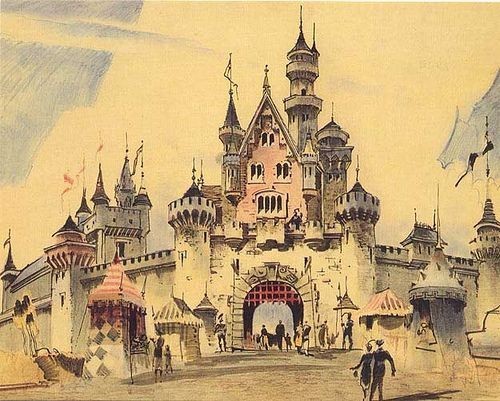
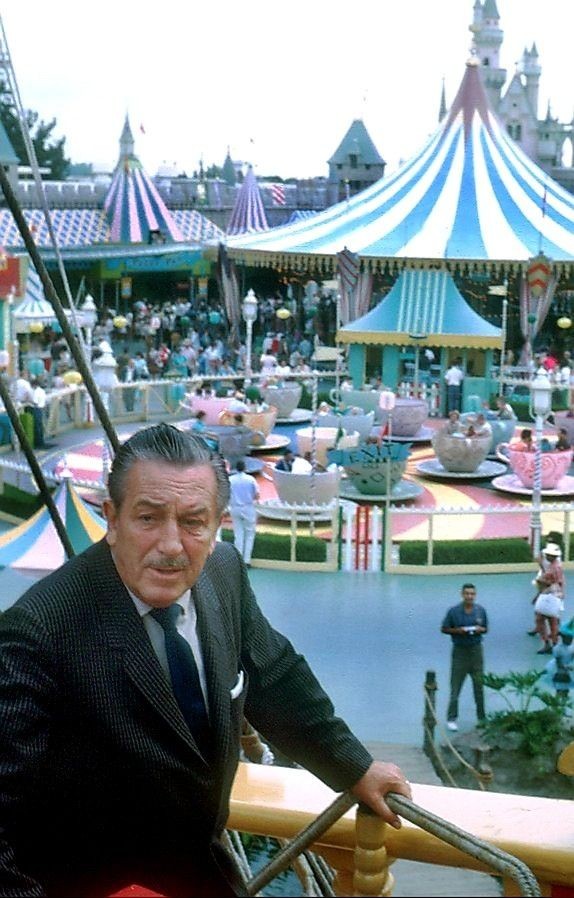
Some attractions like the carousel were themed around King Arthur, and that years before The Sword in the Stone was even released.
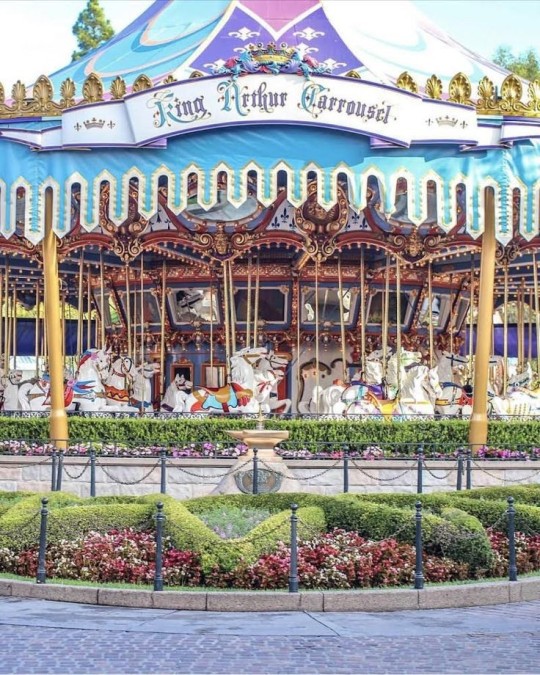
Even the land's dedicatory describes the fairy tale land as an place where the "age of chivalry" is reborn.
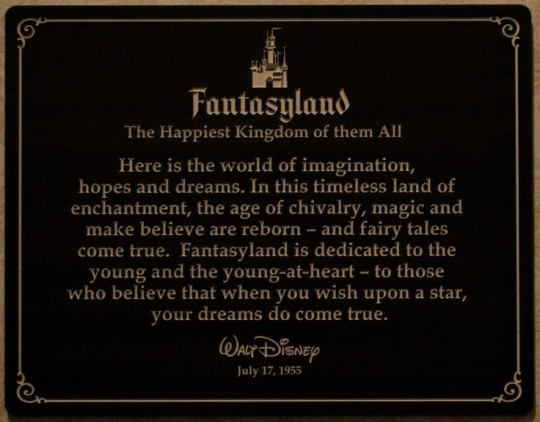
But for some reason, around the 80's, the land was completely refurbished and now it looks like a Bavarian village.
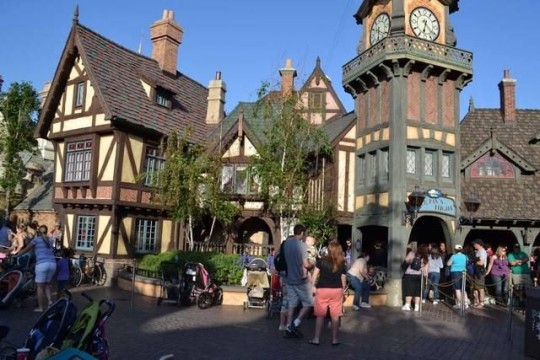
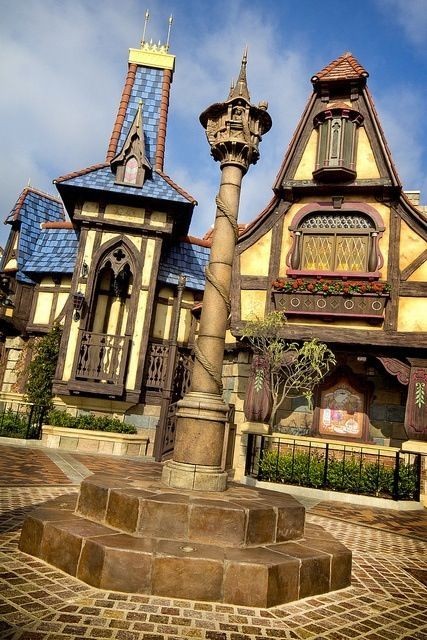
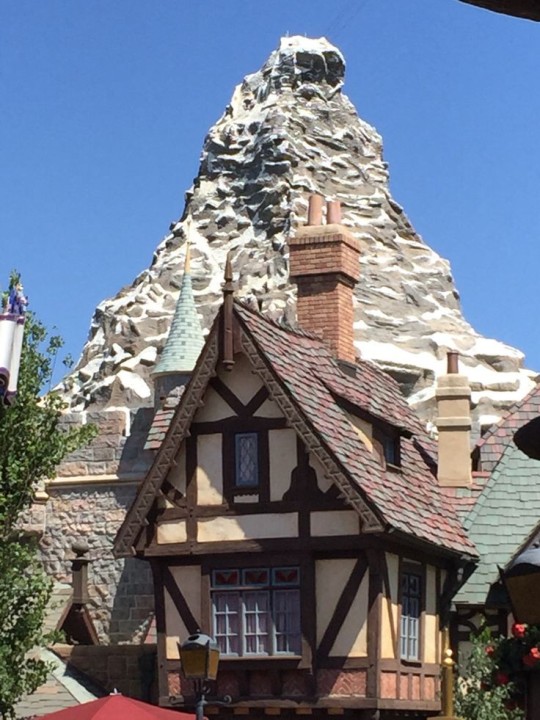
I honestly doesn't know why the change?
Thoughts?
@ariel-seagull-wings @princesssarisa
27 notes
·
View notes
Note
Is it just me, or Americans and Europeans depict the standard, stereotypical fairy tale setting differently?
In my opinion, Americans depict the fairy tale setting as closer to the middle ages. The Fairy Tale Setting is often just a more colorful standard, almost Tokien-like, Fantasy Setting.
Meanwhile, in actual European adaptations of said tales, the stereotypical fairy tale setting is closer to the 18th, 19th century, with the architecture being the only thing vaguely medieval
Yes, I actually do believe as such. Mind you, I cannot speak for all of Europe - mainly France and a handful of other countries I am vaguely aware of adaptations (like England or Germany).
And I believe it is due to two specific things.
A) The very "American" view of fantasy. I mean, we have been repeating and endlessly talking about it for decades now - but for Americans everytime there is something fantasy or magical it is either "standard European medieval setting" either "modern-day America". And when I say "standard European medieval setting", it is this sort of idea and phantasm American built of a vaguely European setting which mixes various countries of Western Europe (Americans only have taken recent interest in other parts of Europe, such as Northern or Eastern, due to the success of things like "Midsommar" and folk-horror and whatnot), and various eras of the Middle-Ages (the Middle-Ages were divided into three specific period quite different from each other), with a good handful of things that were not from the Middle-Ages (like the witch-hunts, for example, they were Renaissance, not medieval).
Of course it is due to a mix of general ignorance about Europe (or any part of the world that is not the USA), and of not actually caring about the original setting since their point is either to parody/reinvent the fairytales in lighter/darker ways, or prove that theses stories are "timeless" and can invent outside of any specific context (which does greatly benefit Americans since like that they can snatch anything they like). Mind you it isn't something universal - take the Disney movies for example. They might not be quite exact, but at least they made a neat effort to evoke different cultures and different eras of Europe. It is very obvious that Disney's Snow-White, Cinderella and Sleeping Beauty take place in various points of Europe's history and in different countries (Snow-White's visual influence by German furniture and statues versus the nods to French culture in Cinderella ; Sleeping Beauty's medieval illumination visual versus the more modern royal outfits of Cinderella, etc...). But it is an effort that got completely lost through time (and I think it can be shown in how, when Disney made "Enchanted", their fairytale setting was turned into a random fantasy setting outside of time and space - it did reflect quite well how people saw the fairytale world at the time).
And you know what is even worse? This "random medieval setting" you speak of is NOT even Tolkien's! Tolkien setting was not medieval in the slightest, and doesn't look like your usual "medieval setting". Just look at the visuals of the Lord of the Rings movie, compare it with some "random fairytale setting" and you see the huge gap. If anything, Tolkien's world is more of a "Dark Ages" (you know, this unknown gap between Antiquity and Middle-Ages) feeling than anything, due to mixing Ancient Scandinavia with Ancient Greece and Dark Ages Arthurian Britain.
But... when you think about it, that the Americans would create such an unclear and artificial setting for their fairytales make sense, since this is literaly what "their" fairytales were compiled as. I'll explain: when you ask an American to list you fairytales, when you see the fairytales used in the American media, it is a Frankenstein-creature. You've got the brothers Grimm and Charles Perrault and Andersen and Joseph Jacobs and nursery rhymes and some Asbjornsen and Moe fairytales... Their exposition to fairytale was by compilations of stories literary and folkloric, from different centuries and different countries, mixed together as one. As such... it makes sense for them a fairytale world would look like a pile of mashed-potatoes in terms of history-geography. Because they have to build a world that mix all of these stuff as one... (Plus something-something about the Americans being fascinated by the Middle-Ages because they did not have one?)
B) The Europeans are very "conscious" about fairytales. I will almost say "self-conscious".
Europeans are bound to always test and try various time-eras, fashions and context for fairytales due to a set of three reasons.
1) We have centuries of "traditional medieval imagery" that the Americans lack. Since our fairytales were published between the 17th and 19th centuries - some even by the 20th - Europe already underwent the whole "Random medieval setting" phase through popular imagery and children book and whatnot. America just begun it from the 19th/20th century - we have been at it for two, three more centuries. So today we are moving forward (and in general, while there are many aspects Europe is "late" compared to the USA, in many other ways Europe is "in advanced" compared to the USA, just because of how "young" this country's history is).
2) We are aware of the context of our own fairytales. Due to the language barrier, for example, we know every time a story comes from somewhere else. We have folktales compilations classified by countries and regions. And everytime we bring up a specif set of fairytales, we bring up the life, job and time-era of the fairytale tellers (Perrault, Grimm, Andersen, which are our "national treasures" - unlike Americans for which they're just "yeah little foreign guys we see in the distance"). As such when the French talk about Cinderella or Puss in Boots, the very images of Renaissance are brought up, the same way a German will immediately think of the Napoleonian wars and the post-Napoleon era when thinking of the Grimms - even though the fairytales are supposed to be in the "pseudo-medieval" setting.
3) Europe has been flooded and dominated by the American media when it comes to fairytales. As such we are very aware and accustomed to the "pseudo-medieval" setting popularized by America, and when Europeans try to do their own thing, they usually try to set themselves apart from it, due to knowing how cliche and Americanized this already is. Something very similar happened with French fantasy literature for example - French fantasy books are always trying to stand away from the "cliche American fantasy book" precisely because we are flooded with them and they form the bulk of our fantasy literature, so as such we are very aware of the flaws and stereotypes and expectations coming with the genre... It also doesn't help that most of the castles and "old-fashioned" architecture around Europe is not medieval per se (or that the medieval architecture is for example very impractical when it comes to filming movies), and we have much more Renaissance buildings and the like. In France for example most castles are Renaissance-era. "Real" medieval castles (as in medieval castles not "remade" by Renaissance or modern designers) are much rarer, or not as well preserved as the Renaissance ones.
Anyway this post got way bigger than I intended, but if you ask me some of my thoughts, here they are - mind you they are just my thoughts and I can't speak for every European. I am just one little eye and one little mind in a big big world... But that's the things I am led to believe.
#fairytale adaptation#ask#fairy tales#fairytales#american fairytales#disney fairytales#fairytale cinema#fairytale adaptations
29 notes
·
View notes
Text
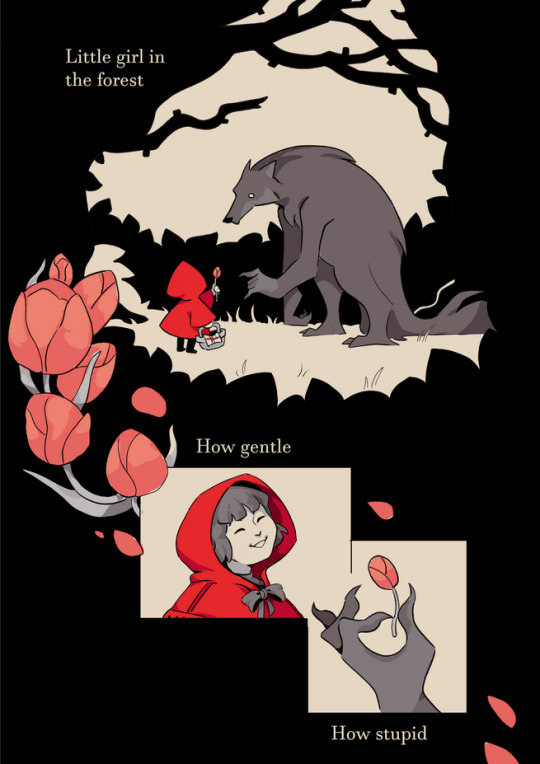


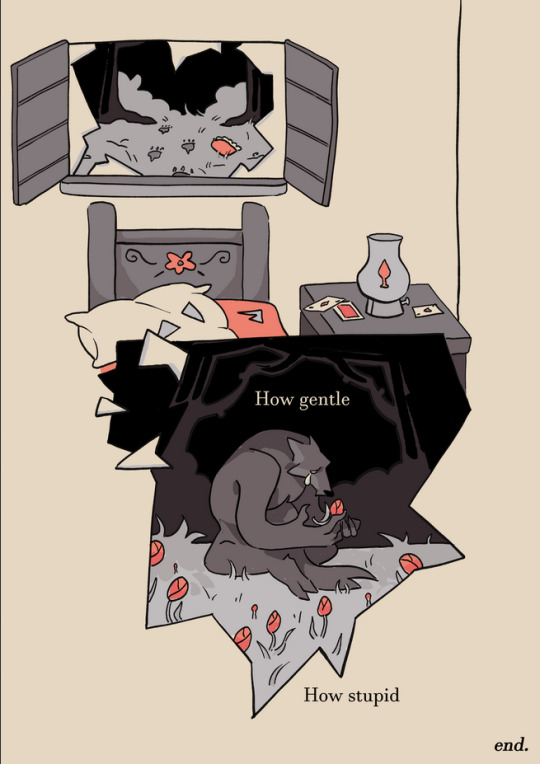
Red riding hood comic collab with the wonderful @yeehawpim (go check out their blog for loads of great comics!) 🌷
See the layouts he did here!
#james art times#artists on tumblr#comics#comics!! very excited to do this and especially with pim who is just fantastic at what they do#fairy tales#little red riding hood#pim did the layouts and I rendered these and my goodness was it a good time#he also did the image descriptions so huge shout out for that as well#go check out her comics! you will not regret it
49K notes
·
View notes
Photo
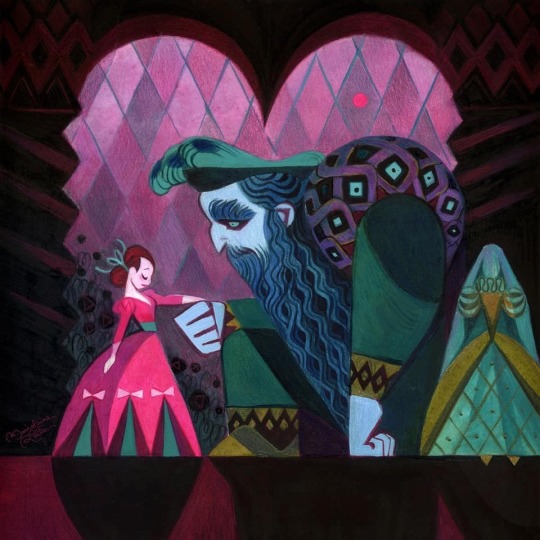


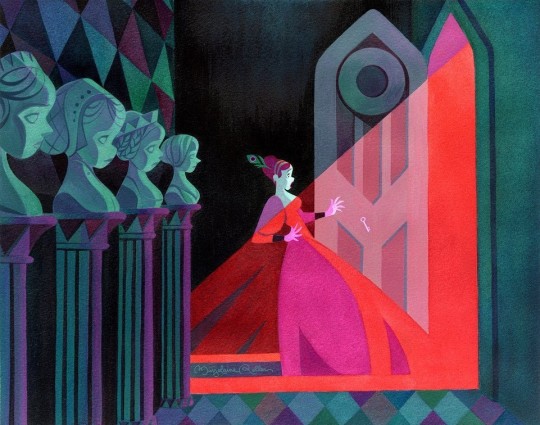
Bluebeard by Marjolaine Roller
42K notes
·
View notes
Text
After watching Cinderella (the original animated movie, which was my favorite as a child), it strikes me how it solves many common problems people have with this fairy tale. Like:
Why did they try to identify the mystery girl using her shoe size? Because the bullheaded king's only clue to her identity was the shoe the Grand Duke picked up off the steps.
Why didn't the prince recognize her by her face? Because his father wouldn't involve him in the process at all, and wasn't the one going around trying to find her.
Why did the prince want to marry a lady he only met that night? Because his father was going to force him to marry someone, and he genuinely liked this woman.
Why did Cinderella want to marry a man she only met that night? Because marriage was her best and most secure way to freedom. Fucked up, but you can't say it's unrealistic for the setting of a fairy tale. She also genuinely liked him.
If they're using the slipper to find her, wouldn't it be more sensible to search for the person with the other slipper? Yes. The King is purposefully nonsensical and the Duke is purposefully terrified enough of him to carry out his orders to the letter. Furthermore, they end up doing that in the end anyway, because the Duke's glass slipper is shattered, and Cinderella brings out the one she has to prove her identity.
Why didn't the stepmother and stepsisters recognize Cinderella at the ball? Because they were dancing too far away, and then left the party to dance in private, which was possible because the King wanted very badly for his son to hit it off with someone and tried to arrange the best conditions for that to happen.
Why didn't Cinderella save herself? Because in real life, abuse victims should not have to shoulder that responsibility, and usually can't. In real life, you need and deserve an external support system. Asking for help, in this kind of situation, is very important. She is saved by others because she is loved. Because she is not alone. Because she has friends who love her, and want her to be happy and safe and free. Because in real life, people who want to help someone who is suffering are like the mice. We can't pull out miracle solutions, but we can provide companionship and if we're in the right place at the right time, we can help the person find a better life.
Why didn't the fairy godmother save Cinderella from her abusive household, or try to help her sooner? Because she's magic, and magic can't solve your problems. Quote: "Like all dreams, well, I'm afraid it can't last forever." This (and Cinderella's dream of going to the ball) is a metaphor for pleasurable things in bad circumstances. An ice cream won't get rid of your depression, but it will provide you with momentary happiness to bolster you, as well as the reminder that happiness in general is still possible for you. Cinderella doesn't want to go to the ball so she can get away from her stepmother and stepsisters, or so she can meet someone to marry and leave with. She wants to go to the ball to remind herself that she can still have things she wants. That her desires matter. This is important because the movie does a very good job of illustrating Lady Tremaine's subtle abuse tactics, all of which invisibly press the message that Cinderella doesn't matter. While going to the ball and fulfilling her dreams may not be a victory in the material sense, it is still a victory against Lady Tremaine's efforts.
Why is Cinderella's choice to be kind and obedient framed as a good thing, when you are not obligated to be kind to your abuser? This one walks a very fine line, but I think the movie still makes it make sense. Lady Tremaine never acknowledges her cruelty. She always frames her punishments of Cinderella as Cinderella's fault. Cinderella is interrupting, Cinderella is shirking her duties, Cinderella is playing vicious practical jokes. Cinderella is still a member of the family, of course she can go to the ball, provided she meet these impossible conditions. Lady Tremaine's tactics are designed to make Cinderella feel like she must always be in the wrong and her stepmother must always be in the right. If Cinderella calls her stepmother out on her cruelty, or attempts to fight back, Lady Tremaine can frame that as Cinderella being ungrateful, cruel, broken, evil, etc. If Cinderella responds to her stepmother's cruelty defiantly (in the way she's justified to), she's not taking control out of Lady Tremaine's hands. Disobedience can be spun back into her stepmother's control. She wants Cinderella to be angry and sad and show how much she's hurting. So since Cinderella is adapting to her situation, she chooses to be kind. Not only because she naturally wants to be and it's part of her personality, but because it is a form of defiance in its own way, and it allows her to keep a reminder of her agency and value. Her choice to be kind is her chance to keep her own narrative alive: she is not obeying because her stepmother wants her to and she has to do what her stepmother does, but because she wants to. It's a small distinction, but one that makes all the difference in terms of keeping her hope and identity. (Fuck, I wrote a whole paragraph about how this doesn't mean you can't be angry at people who hurt you or that you need to be kind to deserve help, and then deleted it by accident. Uh. Try again.) Expressing anger and pain is an important part of regaining autonomy and healing. Although it is commendable to be kind while you are suffering, it is NOT required for you to get help or be worthy of help. If Cinderella's recovery was explored beyond "happily ever after" she would need to let herself be angry and sad to heal. Cinderella is not only kind because it comes naturally to her, but because it's her defense against the abuse she's suffering. Everyone's story and experiences are different, and one does not invalidate the other.
Bonus round for answers that aren't part of the movie:
Why didn't Cinderella run away? Where would she go? Genuinely, in hundreds-of-years-ago France, where would she go if she snuck out of the window with a change of clothes? With her step-family, she's miserable and abused, but she's fed, clothed, and in no danger of dying or being taken advantage of by anyone other than her stepmother and stepsisters. Even if she escapes and manages to find financial security, her stepmother might be able to find her and get her back.
Why didn't Cinderella burn the house down with them inside it/slit their throats in the night/poison their food/etc.? Because that's a revenge fantasy, and this story is a fantasy about being saved. There's nothing wrong with making Cinderella into a revenge fantasy. That's perfectly fine, as long as you acknowledge that the other type of fantasy is also a valid interpretation. (I mean, the original fairy tale features the stepsisters getting their feet mutilated and all three of them getting their eyes pecked out, so go for it.)
Why isn't Cinderella more proactive in general? Because she's a child who has been abused for the back half of her life, who has had to be focused on survival because. you know. she's an abused kid.
How did she dance in glass slippers? Gotta agree with you there man, that's weird.
29K notes
·
View notes
Text
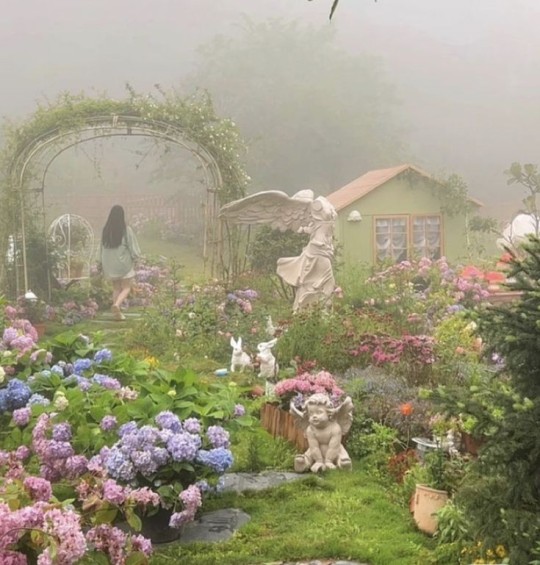

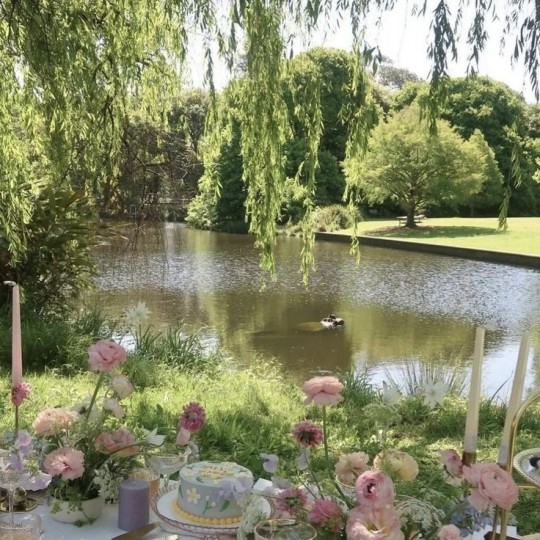

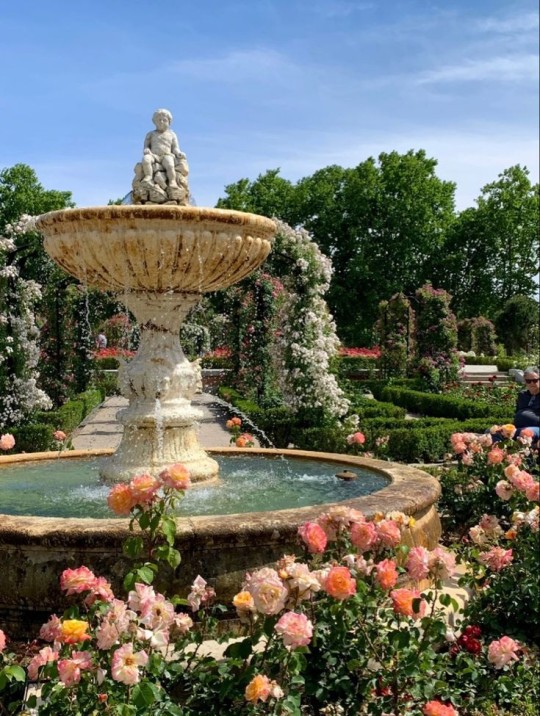

#aesthetic#cottage aesthetic#cottagecore#fairycore#nature#naturecore#cottage witch#flowers#fairy aesthetic#fairy tail#fairies#fairy tales#garden#beautiful#green aesthetic#green#life#lifestyle
9K notes
·
View notes
Text
For the past few months I’ve been working on a gothic/folk horror D&D campaign setting based on European fairy tales.
The heiress wereboar daughter of the Three Little Pigs is having an illicit affair with the nephew of the Frog Prince and I want to see how long it takes my party to realize that it’s just Miss Piggy and Kermit
9K notes
·
View notes
Text
After shoving Hansel in the oven, the witch turns to Gretel - who is currently fending the witch off with a gingerbread chair - and says:
"I can't believe you thought a trail of breadcrumbs would save you. I mean, honestly, this is a forest! It's full of animals. Honestly, the very idea that a dumb shit like you thought you could get the better of me is absurd."
Gretel hits her in the face with said chair. To be fair to the witch, she takes the chairshot like a champ.
"Ow!"
"Did you know," says Gretel, "that crows are capable of facial recognition?"
"Eh?" Says the witch, clambering to her feet and pulling a candy cane sledgehammer off the wall. "What's that got to do with anything?"
"Not only that," Gretel continues, "but they can remember both friends and enemies. And they'll often follow people they remember as friends."
The two fence with their sugared weapons for a moment, before the witch knocks the chair out of Gretel's hands.
"Enough with the bird facts! Honestly, this whole attempted escape has been utter clownshoes. Get in the fucking oven!"
She seizes Gretel by the collar. Gretel immediately sandbags, letting her whole body go limp. This eminently practical defense forces the witch to try and deadlift her. Which is hard, as the witch often skips leg day.
"For example," Gretel says, as the witch struggles and grunts, "if you feed crows a lot of breadcrumbs, they'll probably start to see you as a friend and follow you in the hope of more food."
The witch stops. Outside, she hears the thunder of wings.
"They'll even bring you shiny things they find as presents!" Says Gretel, as a corner of the gingerbread ceiling is suddenly cut away by a large crow with a knife in its mouth.
"Oh shitballs." Says the witch, as the crows descend. "I hope you know this is a great unkindness."
"Technically," Says Gretel, "It's a murder."
---
Thank you for reading. If you'd like to support my writing, you can do so at https://ko-fi.com/strangelittlestories
69K notes
·
View notes
Text
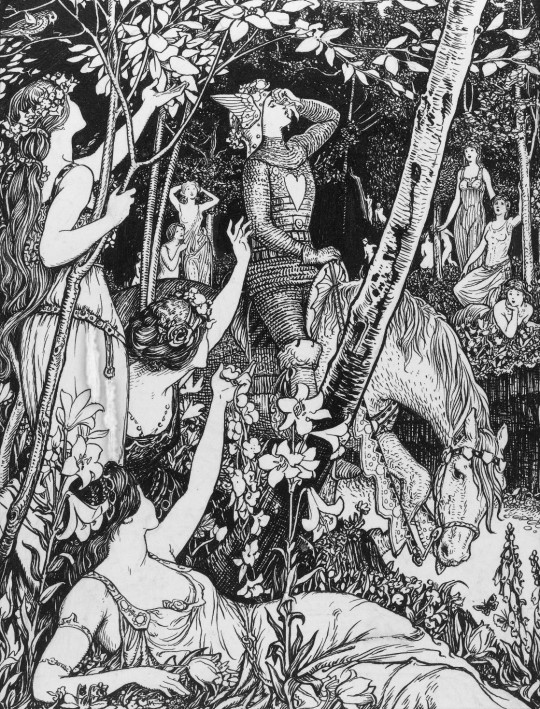
Among the flowers were lovely maidens calling to him with soft voices, from The Fairy of the Dawn for Andrew Lang's The Violet Fairy Book by Henry Justice Ford (1906)
#henry justice ford#art#illustration#golden age of illustration#1900s#1900s art#vintage art#vintage illustration#vintage#british art#british artist#books#book illustration#fairy tales#fairy tale#fairytale art#knight#maidens#classic art
7K notes
·
View notes
Text




And I hope you'll let me be in your story.
ig credit: nev.in.color.
#fairy tales#fairycore#fantasy#alternative#aesthetic#dark academia#dark academic aesthetic#dark aesthetic#aestheitcs#dark#art#light acadamia aesthetic#light academia#nature photography#natural#nature#nature aesthetic#nature art#nature academia
3K notes
·
View notes
Text
Actually this has to be its own post, I hate how people treat the moral of the ugly duckling tale like it’s “don’t worry you’ll grow up to be beautiful”
no!!! It was never an ugly duckling because it was never a duck!!! It was a baby swan!!! A cygnet!!! It was never ugly to begin with!!! People only thought it was ugly because they were judging it by their own standards!!!! The moral is that you aren’t ugly, people just don’t see you as you are!!!!
39K notes
·
View notes
Text
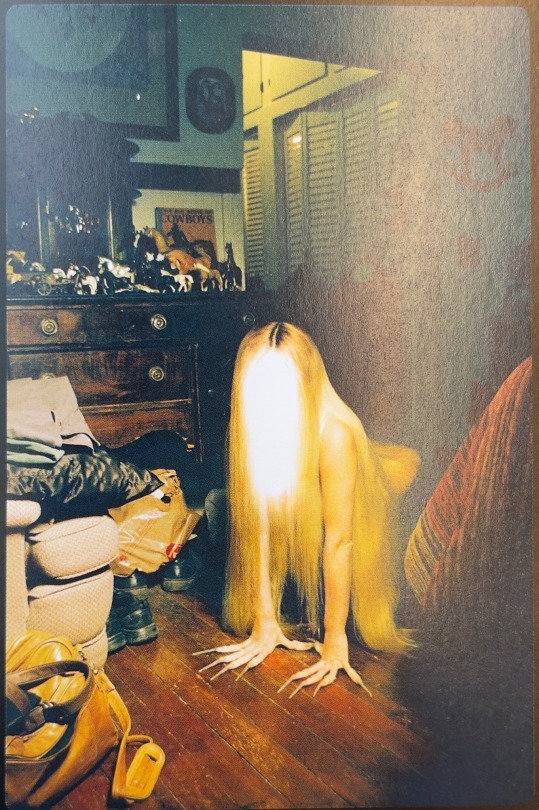
Alexa Demie in Fairy Tales (2020) Photography: Petra Collins
6K notes
·
View notes
Text
Fairy tale nerds of Tumblr I need your help.
I've been trying to find a fairy tale for AGES, this has been almost a decades long quest. I first read it in a Highlights magazine around the mid 2000s, when the theme was "Fairy Tales from around the World." Now I don't know if this is actually an older fairy tale or just one that was made up for the magazine masquerading as a story from somewhere else. I've done my own research and have come up zilch.
So, this story was about a prince that was cursed to be a wolf until he was able to bite a bride the night of her wedding. Well, it just so happens that such a woman is riding through the forest with her new beau, a very uncouth man that calls her his "little chicken." Long story short, a pack of wolves waylay their carriage, the wolf prince bites the lady, becomes human again, and they fall in love and marry.
And what happened to her original husband?
Well naturally he gets turned into a chicken and they eat him at their wedding feast.
Classic.
if anyone knows the title of this fairy tale or where it may have originated, please let me know! I'd love to see if I can read it again.
24K notes
·
View notes
Photo
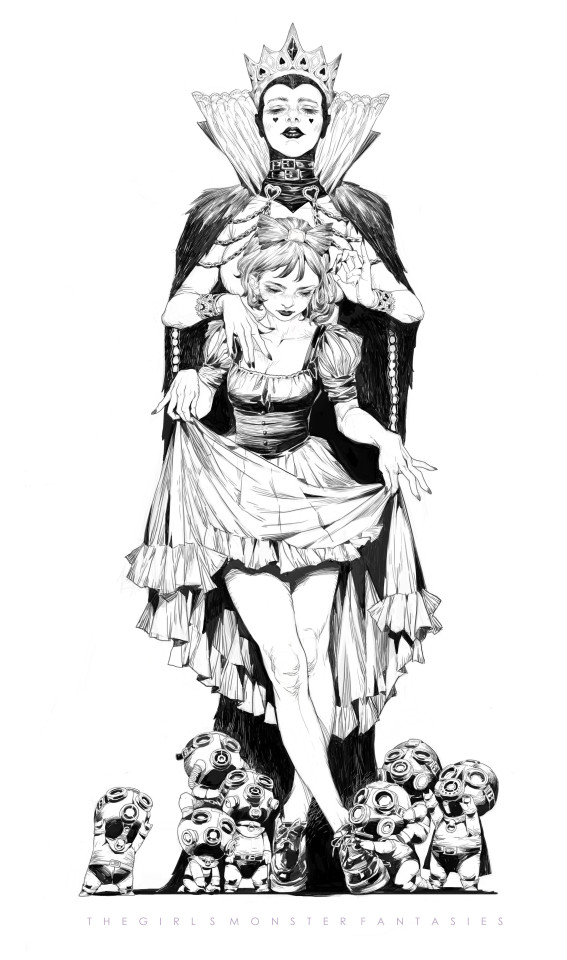
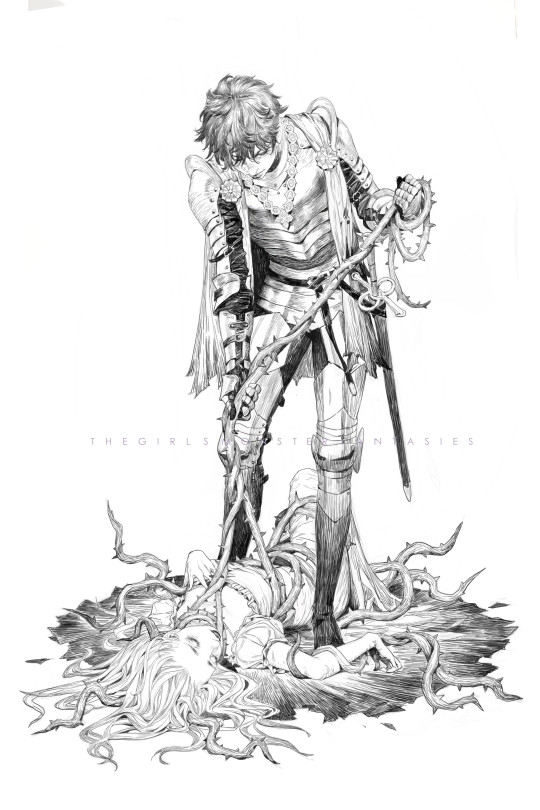
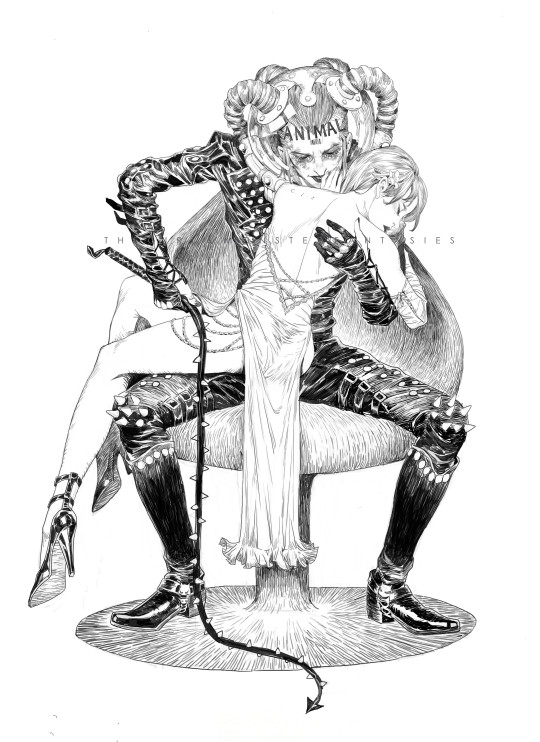

Fairy tales by 冯伟 Feng Wei(c12)
13K notes
·
View notes